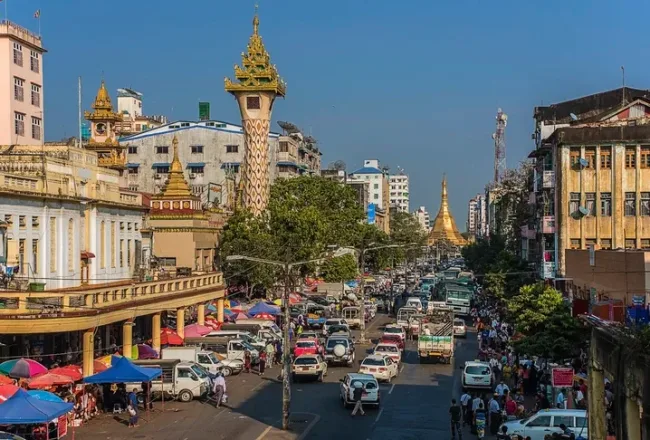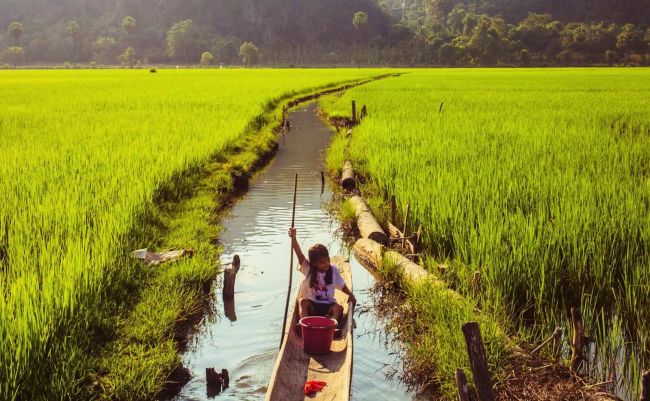
Myanmar
Welcome to Myanmar
Traveling to Myanmar? You may need a visa – find out if you do, which type, and how to apply so you can get the paperwork out of the way and focus on your trip.

What’s a Myanmar Tourist eVisa, and who’s it for?
Who’s the Myanmar Tourist eVisa for? Travelers from over 104 nationalities are eligible for the Myanmar Tourist eVisa.
Who isn’t eligible for the Myanmar Tourist eVisa? Nationals of Brunei, Cambodia, Indonesia, Laos, the Philippines, Thailand, and Vietnam, visiting for 14 days or less and entering and departing from Yangon, Mandalay, or Naypyidaw International Airport. If you're uncertain whether you need a visa, please use our Visa Checker Tool to check your eligibility.
What’s the purpose of the Myanmar Tourist eVisa? The Myanmar Tourist eVisa allows for:
-
Tourism: Sightseeing, visiting family or friends, and engaging in leisure activities.
-
Short Visits: Attending short-term yoga courses, short-term courses on local cuisine, etc., not amounting to an academic degree.
How long can you stay with the Myanmar Tourist eVisa? The eVisa is valid for a Single entry with a stay of up to 28 days in total within a validity period of 90 days from the issue date.
What’s a Myanmar Business eVisa, and who’s it for?
Who’s the Myanmar Business eVisa for? Business travelers from over 50 nationalities must apply for the Myanmar Business eVisa.
Who isn’t eligible for the Myanmar Business eVisa? Nationals of Brunei, Cambodia, Indonesia, Laos, the Philippines, Thailand, and Vietnam, visiting for 14 days or less and entering and departing from Yangon, Mandalay, or Naypyidaw International Airport.
If you are uncertain whether you need a visa, use our Visa Checker Tool to check eligibility.
What’s the purpose of the Myanmar Business eVisa? The Myanmar Business eVisa is for short-term business activities like meetings and networking. It doesn't cover long-term employment.
How long can you stay with the Myanmar Business eVisa?
The eVisa is valid for a Single entry, and you can stay in Myanmar for a maximum of 70 days in total. You must use the Myanmar Business eVisa within 90 days after it is issued.

What are the Myanmar long-term visa options, and who are they for?
Myanmar offers many long-term visas for different needs and purposes, such as:
-
Diplomatic/Official Courtesy Visa: For individuals entering Myanmar for diplomatic visits, the validity is tied to the assignment period.
-
Business Visa: Facilitates travel for business-related activities, available as both single-entry and multiple-entry visas, with the single-entry visa valid for 70 days and the multiple-entry visa valid for 3 months, 6 months, or one year.
-
Social Visa: Allows travelers to visit friends and relatives in Myanmar, with both single-entry (valid for 70 days) and multiple-entry options.
-
Religious Visa: Issued for engaging in religious activities, available for a single entry with a 70-day stay or multiple entries with 3/6 months or one-year validity.
-
Transit Visa: For travelers passing through Myanmar, valid for 24 hours.
-
Official Visa: For individuals involved in activities recognized by the UN/Government of the Union of Myanmar, available as single or multiple entries.
-
Employment Visa: For those seeking employment in Myanmar, valid for 70 days with requirements for specific documentation from the employing company in Myanmar.
-
Education Visa: Necessary for individuals intending to teach or study in Myanmar, available as a single-entry visa for 3 months or a multiple-entry visa for 3/6/12 months.
-
Journalist Visa: Designed for journalists entering Myanmar for media activities, valid for 28 days.
-
Crew Visa: For crew members of vessels or aircraft, available as a 90-day single-entry visa or a multiple-entry permit for 3, 6, or 12 months.
-
Workshop/Seminar/Meeting/Research Visa: For attending workshops, seminars, meetings, or conducting research, valid for 28 days and extendable.
For more detailed information and application procedures, it's recommended to visit the official Myanmar Visa website, as we currently don't offer these visas.

Staying healthy in Myanmar: Here’s what you need to know
Traveling to Myanmar soon? Stay informed with essential health guidelines for a worry-free trip. Here's what travelers should know.
Stay informed on vaccination requirements and health advisories
-
Vaccinations: You may need to be vaccinated against Hepatitis A and B, Japanese Encephalitis, Typhoid, and Rabies. Measles vaccination is also recommended due to rising cases worldwide. Travelers are advised to check the CDC website for updated information.
-
COVID-19 Guidelines: While the requirement for COVID-19 vaccination certificates has been relaxed, a Health Declaration Form is mandatory on arrival. It's advised to check requirements with your airline or via organizations like Travel Bans.
Understanding medical facilities
-
Medical Facilities: Major cities in Myanmar offer several medical facilities, including hospitals that cater to tourists. However, in more remote areas, medical facilities can be limited.
-
Health Insurance: It's crucial to have comprehensive travel health insurance that covers medical costs in Myanmar. Make sure your policy includes coverage for medical evacuation.
Health insurance advice
-
Opt for travel insurance with substantial medical coverage due to the country's high costs of private medical care.
-
Verify your insurance coverage for international travel with your provider to ensure you have the necessary protection.
Health precautions and safety tips
-
Water and food safety: Be cautious of water and food hygiene standards to prevent illnesses. Opt for bottled or treated water and ensure food is properly cooked.
-
Prevent bug bites: Diseases like Dengue, Zika, and Chikungunya can be transmitted through mosquito bites. Use insect repellent and wear long-sleeved clothing to reduce the risk.
-
Avoid contact with animals: To prevent diseases like Rabies, avoid contact with animals, especially dogs, cats, and wildlife.
Medication for personal use
Follow these tips to bring into Myanmar some over-the-counter medicines:
-
Declare all medications: Report all medication for personal use to the customs authorities.
-
Original packaging: Always keep medicines in their original containers and transparent bags in your hand luggage.
-
Prescription or doctor's letter: Present the medical prescription issued by your doctor or other competent authority.
-
Check for restrictions: Call the embassy to verify that all of your prescription(s) are legal to bring with you.
-
Quantity aligned with itinerary: Bring only a reasonable quantity that aligns with your stay duration to avoid complications.

 Australia ETA Online
Australia ETA Online
 United Kingdom ETA
United Kingdom ETA
 India Tourist eVisa
India Tourist eVisa
 Canada ETA Visa
Canada ETA Visa
 Turkey eVisa
Turkey eVisa
 Egypt eVisa
Egypt eVisa
 Singapore SG Arrival Card
Singapore SG Arrival Card
 Indonesia eVoa Visa
Indonesia eVoa Visa
 Aruba ED Card
Aruba ED Card


